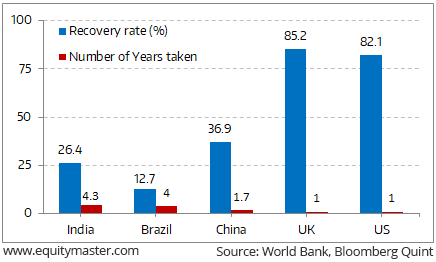Stock markets in India are presently trading marginally higher. Sectoral indices are trading on a positive note with stocks in the realty sector and healthcare sector witnessing maximum buying interest.
The BSE Sensex is trading up 18 points (up 0.1%) and the NSE Nifty is trading up 3 points (up 0.02%). The BSE Mid Cap index is trading up by 0.7%, while the BSE Small Cap index is trading up by 1.1%. The rupee is trading at 63.72 to the US dollar.
In the news from the banking sector, as per an article in the Economic Times, the government has provided Rs 75 billion of fresh equity to six stressed public-sector banks (PSBs) in order to help them meet the prescribed regulatory requirement.
The six banks include Bank of India, IDBI Bank, UCO Bank, Bank of Maharashtra, Dena Bank and Central Bank of India. These banks have received equity through preferential issue of shares from the government with two of them informing stock exchanges about the development.
The government, as a part of its Indradhanush Plan to revitalise state-owned lenders, had proposed to infuse Rs 700 bn out of Budgetary Allocations in them. However, so far, it has infused Rs 518 bn in public sector banks (PSBs).
In October, the government also announced the recapitalisation plan to inject Rs 2.11 trillion into public sector banks over a period of two years. This move was mainly aimed at resolving the long standing non-performing assets (NPA) problem of PSBs. It is expected to shore up the capital of state-run banks, spurring them to clean up the bad loan mess and revive lending.
The implementation of this initiative will, however, take some time. As we wrote in a recent edition of The 5 Minute WrapUp...
- ...if historical data is anything to go by, implementation of such initiatives take a long time, especially in India. Recovery takes the longest time here as compared to other developed nations. India takes an average of 4.3 years to resolve insolvencies as compared to one year in the US. Also, recovery rates in India are amongst the lowest at 26.4%.
This is also evident from the chart below:
Loan Recovery Data of Major Economies
So while recapitalisation will benefit PSBs, it appears to be a temporary cure for a recurring disease. The main problem is the lending and corporate governance processes these banks follow.
In the news from the GST space, the government is suspecting that the composition scheme rolled out for small businesses is being misused as there is been noted a leakage of tax revenues.
As per the news, for July-September, around 10 lakh entities had opted for the composition scheme under GST, where only the turnover details have to be disclosed and tax is paid at a flat rate. Of these, only 6 lakh have filed returns till December 25.
The transition to goods and service tax (GST) is a tough one. However, if implemented properly, the tax will reap huge benefits for such businesses in the long run. Also, the tax regime will aid India's tax revenues to a greater extent in the coming future. This augurs well for the country that has one of the lowest tax revenue as a percentage of GDP compared with other countries.
The higher tax revenue receipt will help bolster the country's financials and also provide further ammunition for the government to spend on social welfare and providing additional infrastructure to its citizens.
In order to capture the above revenues, the government should monitor the leakage of tax revenues and ensure efficient compliance of GST. It needs to be seen how this pans out. We'll keep you updated on the developments from this space. Stay tuned.
This article was originally published in English at www.equitymaster.com
Read the complete Indian stock market update. For the terms of use, go here.

No comments:
Post a Comment